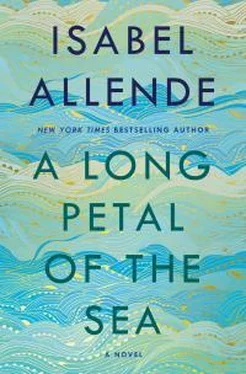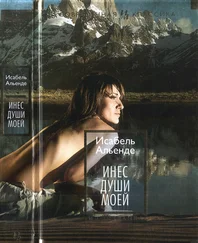—
IT WAS THEN THAT Victor Dalmau met Ofelia del Solar again. Over the years, he had sporadically had news of her, but had never seen her because they moved in very different circles and she had spent most of her life in other countries due to her husband’s profession. He had also done his best to avoid her, concerned that the ashes of that frustrated youthful love might still contain burning embers that could disrupt his orderly existence or his relationship with Roser. He had never understood why Ofelia had cut him out of her life so completely, with no explanation apart from a short letter written in the tone of a capricious young girl that he could not match with the woman who escaped from her art classes to make love with him in a seedy hotel. At first, when he had finished feeling sorry for himself and cursing her in secret, he came to detest her. He attributed to her all the worst defects of her class: lack of awareness, egotism, arrogance, pretentiousness. His loathing slowly subsided, leaving him with the fond memory of the most beautiful woman he had ever known, her infectious laughter and her seductiveness. As time went by, he seldom thought of Ofelia, and never felt the impulse to find out about her. Prior to the dictatorship in Chile, he had heard random scraps about her life, usually from some comment by Felipe del Solar, whom he saw a couple of times a year in order to artificially preserve a friendship based entirely on Victor’s sense of gratitude. He had seen some not-exactly-flattering images of her in newspaper social pages, but nothing in the Arts sections; her work was unknown in Chile. “Well, the same happens with other talented national artists, and more so if they’re women,” Roser remarked, when she once brought back a magazine from Miami that had four full-color pages showing Ofelia’s work. Victor studied the two photos of the artist that accompanied the article. The eyes were those of the Ofelia he knew, but the rest had changed a lot—although that could have been the camera’s fault.
Roser arrived with the news that there was an exhibit of the latest works by Ofelia del Solar in the Caracas Athenaeum. “Did you see she uses her maiden name?” she said. Victor pointed out this had always been the case, especially among Chilean women, and that Matias Eyzaguirre had died years earlier. If she hadn’t taken her husband’s name during his lifetime, why would she do so as a widow? “Well, whatever. Let’s go to the opening,” said Roser.
His automatic reaction was to say no, but curiosity got the better of him. There weren’t many works in the exhibit, but each was the size of a door, so they filled three rooms. Ofelia had not escaped the influence of Guayasamin, the great Ecuadorean painter under whom she had studied. Her canvases were of a similar style, with strong brushstrokes, dark lines, and abstract figures. They didn’t, though, have any of his humanitarian message; there was no denunciation of cruelty or exploitation, nothing of the historical or political conflicts of the time. Instead they were sensual images, some of them very explicit, couples entwined in twisted or violent embraces, women yielding to pleasure or suffering. They confused Victor, as they didn’t correspond to the idea he had of the artist. He remembered Ofelia in the first flush of womanhood, the pampered, naïve, and impulsive girl he had fallen in love with, who painted watercolor landscapes and bouquets of flowers. All he knew of her was that since those far-off days she had been the wife and then the widow of a diplomat; she was a traditional woman, accepting her role. But these paintings showed an ardent temperament and a surprisingly erotic imagination. It was as if the passion he had caught a glimpse of in the dingy hotel where they made love had remained suppressed inside her and its only means of escape was through brushes and paint. Her last canvas, displayed on its own on one wall of the gallery, made a strong impression on him. It was a naked man holding a rifle, painted in white, black, and gray. Victor studied it for several minutes, stirred without knowing why. He went closer to read the title: Militiaman, 1973 . “It’s not for sale,” a voice next to him said. It was Ofelia. She looked different from how he remembered her, and from the few photographs he had seen: older, more faded.
“It’s the first of this series, and it marks the end of a stage for me. That’s why I’m not selling it.”
“That’s the year of the military coup in Chile,” Victor said.
“It has nothing to do with Chile. That was the year I liberated myself as an artist.”
Until that moment she hadn’t looked at Victor, but had been talking while staring at the canvas. When she turned to continue the conversation, she didn’t recognize him. More than forty years had passed since they had been together, and she was at a disadvantage, because in all that time she had never seen a photograph of him. Stretching out his hand, Victor introduced himself. It took Ofelia several seconds to remember the name, and when she did, she gave such a spontaneous little cry that Victor was convinced she had no idea who he was. What for him had been a stab to the heart had left no trace in her.
He invited her for a drink in the café and went in search of Roser. When he saw the two women together, he was struck by how time had treated them so differently. He would have thought that the beautiful, frivolous, rich, and refined Ofelia would have withstood the passage of the years more easily, and yet she appeared older than Roser. Her gray hair looked singed, her hands were gnarled, and the demands of her profession had left her stooped. She was wearing a brick-colored linen tunic that hung loosely to disguise the extra pounds, carried a huge multicolored woven Guatemalan bag, and wore Franciscan sandals.
She was still beautiful. Her blue eyes shone as they had done when she was twenty, but in a face tanned by too much sun and crisscrossed by wrinkles. Roser, who was not vain and had never appeared particularly attractive, dyed her gray hairs and wore lipstick. She took care of her pianist’s hands, her posture, and her weight, and that night was wearing a pair of black pants and a white blouse with the discreet elegance that was her trademark. She greeted Ofelia warmly, but made excuses for not accompanying them: she had to rush off for an orchestra rehearsal. Victor looked at her quizzically, guessing she wanted to leave him alone with Ofelia. He felt a moment’s panic.
—
AT A TABLE ON the Athenaeum patio, surrounded by modern sculptures and tropical plants, Ofelia and Victor caught up on all the most significant events of those forty years. They made no mention of the passion that had once engulfed them. Victor didn’t dare refer to it, much less ask why she had vanished, as this seemed to him humiliating. Nor did she bring it up, because the only man who had counted in her life was Matias Eyzaguirre. Compared to the immense love she had with him, the brief adventure with Victor was a childish folly that would have been forgotten were it not for that tiny grave in a rural cemetery in Chile. She didn’t mention that to Victor either, because she had shared the secret only with her husband. She bore the responsibility for her mistake without broadcasting it, as Father Vicente Urbina had instructed her.
They were able to talk a long while as if they were good friends. Ofelia told him she had two children and had lived happily for thirty-five years alongside Matias Eyzaguirre, who loved her in the same steadfast way as he had pursued her hand in marriage. He loved her so much and so exclusively that their children felt excluded.
“He changed very little. He was always a tranquil, generous man who was unconditionally loyal to me. Over the years, his virtues only became more pronounced. I assisted him as best I could in his profession. Diplomacy is difficult. We changed countries every two or three years—we had to uproot ourselves, leave friends, and start again somewhere else. It wasn’t easy for the children either. What was worse was the social life: I’m no good at cocktail parties or lengthy meals.”
Читать дальше











